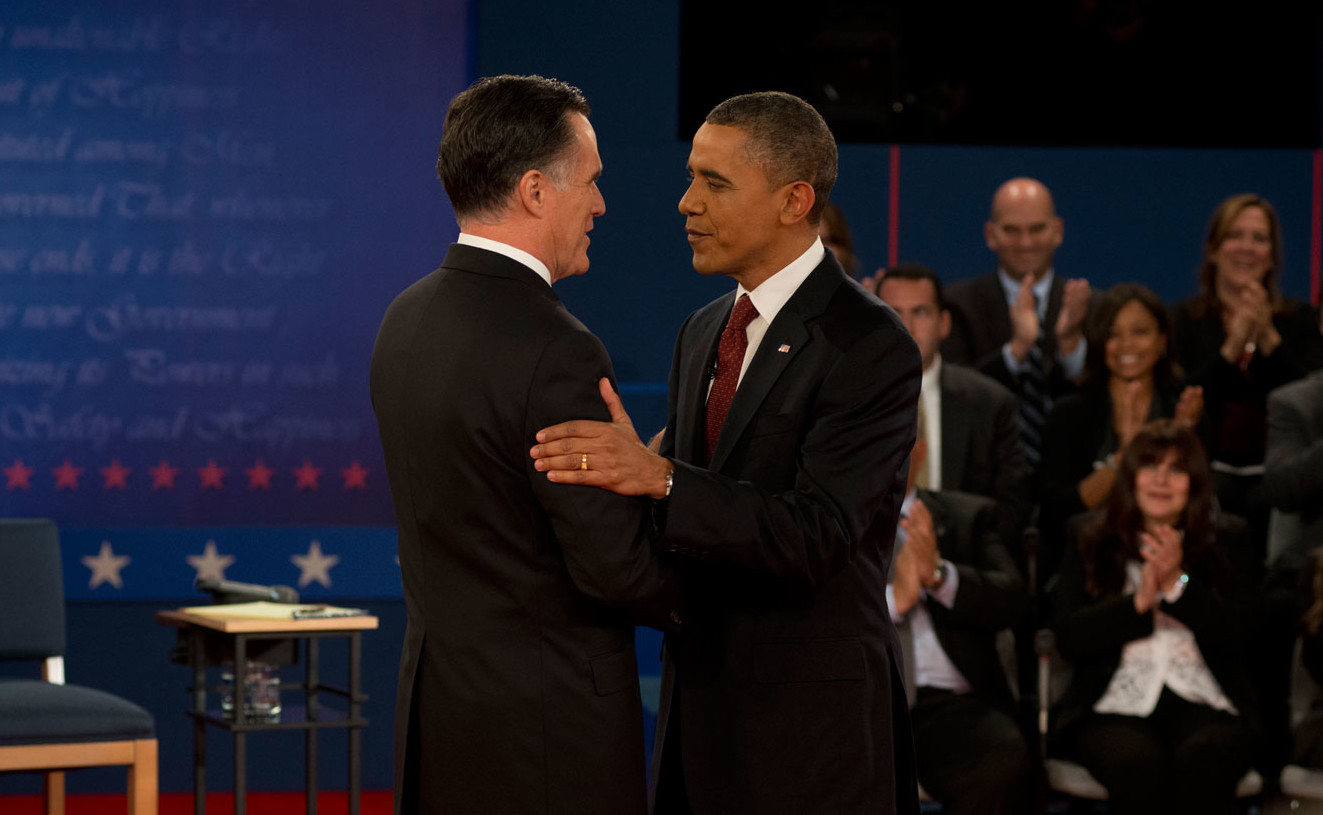The first 2012 Barack Obama vs. Mitt Romney debate is coming up on Wednesday. It’s hard to imagine either of the two participants saying anything we haven’t already heard ad nauseam, and our own Michael D’Ortenzio Jr. has already wondered if the debates are still relevant at all. It looks like the biggest surprises of the night will be Mitt Romney’s well-rehearsed “zingers”—Lincoln-Douglas this ain’t.
It shouldn’t be controversial or shocking to say that in keeping with recent tradition, Obama and Romney’s joint television event will not be a real “debate.” At least four major plots in Aaron Sorkin-created shows have revolved around the inadequacy of modern presidential debates. More importantly, anyone who’s seen one in recent years knows that the debates could be better described as pairs of competing press conferences than thoughtful exchanges of ideas.
How did we get here? It’s not an accident of history nor a media-fueled oversimplification that took the debate out of the debates; rather, it was a deliberate, calculated maneuver orchestrated by the two major American political parties.
In 1976, the Gerald Ford and Jimmy Carter campaigns found themselves with a problem that no American presidential hopefuls had faced before: equal airtime requirements. In order to get around the then-new FCC regulations, the debates had to be genuine news events sponsored by an independent organization; the League of Women Voters stepped up to fill the void.
The Democratic and Republican parties spent the 1980’s jointly chipping away at their sponsor’s authority. This culminated in 1988, when the George Bush and Michael Dukakis campaigns worked out all the details for the debates themselves and presented their agreed-upon plan to the League of Women Voters. The League withdrew its sponsorship and called the debates a “fraud on the American voter.” So the parties created the Commission on Presidential Debates to serve as the intermediary in the League’s stead.
The CPD is a theoretically independent organization, but it takes only the slightest bit of research to see that its constituency is not the average American voter. Of the nine members on the Commission’s Board of Directors, at least four have ties to one of the two major parties. Moreover, only two of the nine are women, and of the seven men at least six are white (information on one of the members has proven quite difficult to find).
Perhaps even more disturbing is that the debates quite literally have corporate sponsorship; donors to the CPD include such populist groups as the International Bottled Water Association (2008 and 2012) and Anheuser-Busch (1996, 2000, 2004, 2008, and 2012). Do the five different airlines who have sponsored debates since 2000 really have the same interests as John Q. Public?
Besides the generally staged nature of the debates, the most pronounced effect of the CPD’s deference to the two major parties is its suppression of third-party candidates. The last third-party candidate to participate in a national presidential debate was Ross Perot in 1992 (he was not invited back in 1996). Third-party candidates have significantly impacted presidential elections at least twice in the two decades since Perot’s last debate appearance, but only the Democrats and the Republicans have enjoyed the benefit of shilling for their agendas through free media on national television.
Libertarian Party candidate Gary Johnson and Green Party candidate Jill Stein (full disclosure: I am an intern for the Stein campaign) have both gained ballot access in enough states to have a mathematical chance of winning the electoral college—no small feat given that election laws are written to favor parties in power—yet they have been shut out of the debates. With only two voices who are frequently of the same mind on the stage, there will be no argument on such major issues as the National Defense Authorization Act, the War on Drugs, and the predator drone strikes in Pakistan.
We have the debates the major parties want: A candidate who sold out on single-payer health care and has embraced civil liberty violations on the left, a candidate with a strong history of social liberalism on the right, and no mechanism for in-depth discussion or suggestion that the American political spectrum is broader than the often-narrow crevice between Obama and Romney.
And so, Wednesday’s debate will be the first in a series of 90-minute informercials in which regurgitated sound bites pass for thoughtful discourse and the false dichotomy of mainstream American politics is shoved down our throats. That such a thoroughly choreographed political spectacle is considered meaningful and newsworthy is as absurd as it is sad. But hey! At least we can look forward to Romney’s zingers.

Lewis Pollis- I am deeply impressed by this analysis of the debate charade. As a As a .very senior citizen, I feel totally alienated by the current culture of non-.
civil society. Your honest analysis of the debate charade is profound and true and makes me sad. love and peace, joanne m. lewis AKA grandma
What's so interesting is that this kind of self-referential power grabs by parties is beginning to play out in other realms of political influence, namely the New York Times' feature expose on campaigns claiming the right to "redact" quotes retroactively. It only takes two campaigns to make the rules; once both parties decide to limit something or make the rules for a debate, they've corned 100% of the market.
There's a distinction, though, that I think you need to draw: between the debates being a fraud because the two parties have leveraged them into negligibility; and the debates being a fraud because they're useless tools for deciding who might be a better President. That seems more like a statement about the platonic Debate as an institution, and I don't agree at all: I think debates still are useful. They revealed what a poor candidate Gore was in 2000, what a slick Willy Clinton was in 1992, that Obama could be a statesman in 2008, etc.